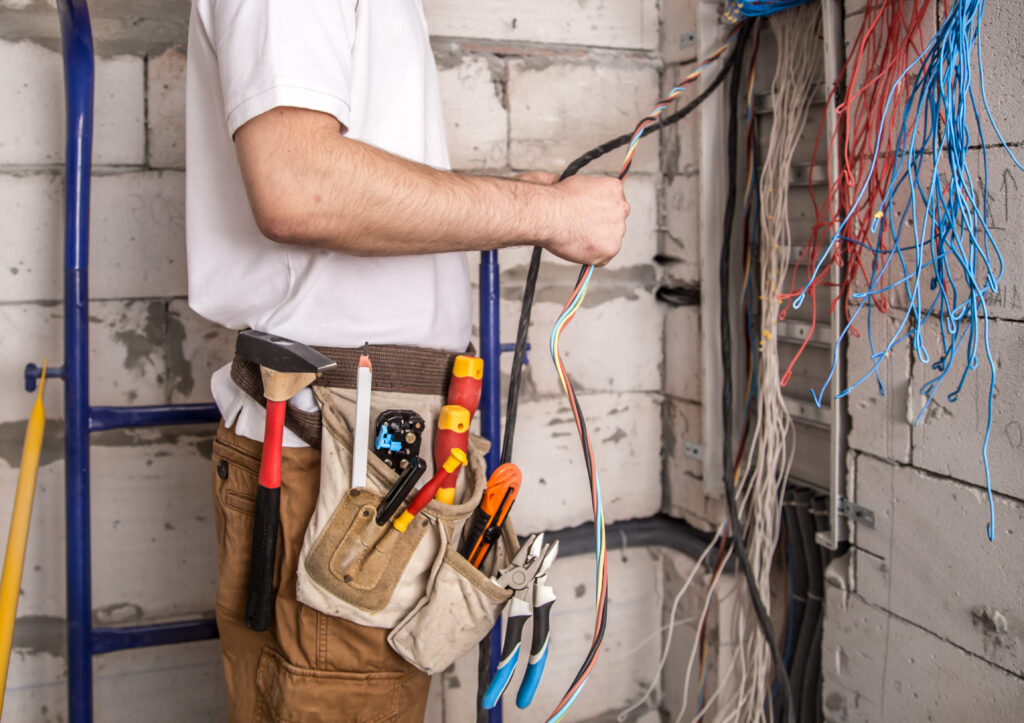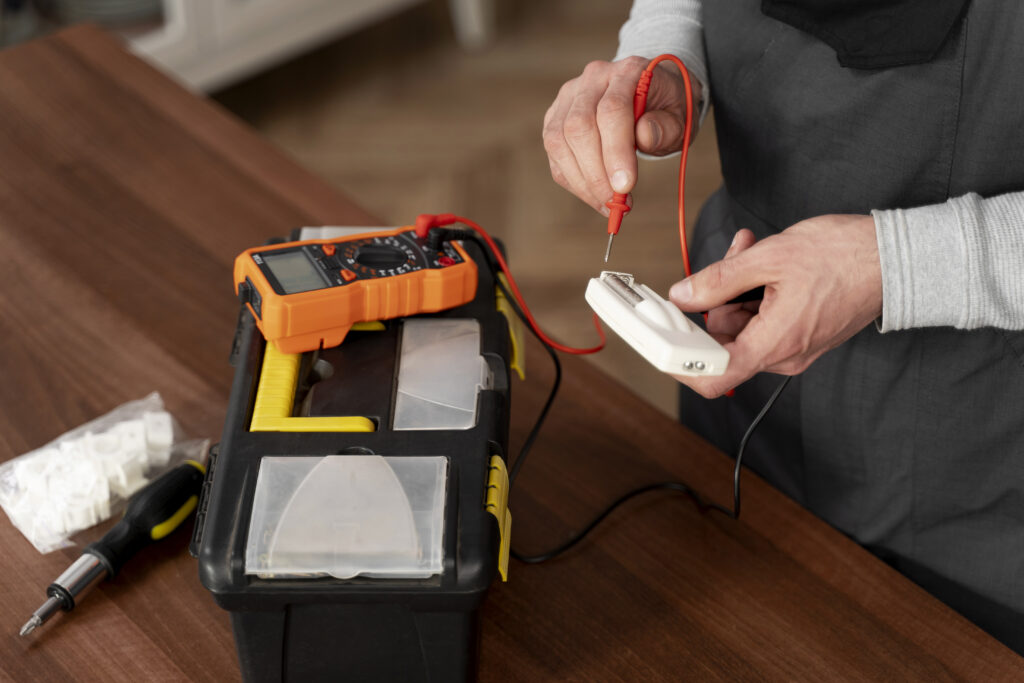39 Best Electrical Tools for Your Tool Belt & Your Business in 2025

Table of Contents
Not every electrician carries the same setup, but the best ones all have one thing in common: tools they trust. In 2025, that means knowing what’s worth keeping on your belt, what stays in the truck, and what helps your business run smoother behind the scenes. This guide breaks down the tools electricians actually rely on.
We’ll cover:
- Smart tips for building your setup
- Everyday carry tools for your belt
- Bigger tools for your van or shop
- Where to get reliable gear
- The business tools electricians are using to quote faster and get paid on time

Before You Get Started: What to Look For in Electrical Tools
Electricians work fast and the tools you carry need to keep up. Working in tight spaces, up a ladder, or digging through your pouch on a time-sensitive job means your gear should be:
- Built to last: Go for pro-grade brands like Klein Tools, Milwaukee, or Ideal. Cheap tools slip, strip, or snap when you need them most.
- Comfortable to carry: You’re wearing this gear all day. Choose tools that balance weight, grip, and size.
- Tested for safety: Don’t mess around with voltage. Look for VDE-rated insulated hand tools and certified gloves.
- Organized for speed: A solid tool belt or bag saves you time on site. Don’t waste minutes digging for a screwdriver.
Basic Hand Tools for Your Tool Belt
Price range: $2 – $150
These are your everyday carry. Lightweight, reliable, and built to stay on your hip.

- Lineman’s Pliers – $30–$50
Grip, twist, cut—an essential for just about everything. - Needle-Nose Pliers – $20–$35
Perfect for tight spaces and pulling wires. - Diagonal (Side-Cutting) Pliers – $20–$40
Your go-to for flush cutting. - Wire Strippers – $20–$40
No frills, no slip—look for precision and comfort. - Cable Cutters – $25–$60
For clean, safe cuts on heavy-gauge wire. - Adjustable Wrench (6–8″) – $15–$30
Small enough to carry, versatile enough for panels. - Screwdrivers (Basic Set) – $20–$50
Don’t cheap out. Get a good grip and magnetic tips. - Insulated Screwdriver Set – $40–$80
Tested for up to 1,000V—don’t skip these. - Nut Drivers (Set) – $20–$40
Ideal for panels and fixture install. - Multibit Screwdriver – $15–$25
One handle, multiple bits. Saves space and weight. - Voltage Tester (Non-Contact) – $20–$35
Quick checks before you touch anything. - Voltage/Continuity Tester – $30–$60
Next level for troubleshooting. - Torx and Square-Drive Screwdrivers – $15–$30
For panels and commercial installs. - Fish Tape (25–50 ft) – $25–$60
Run wire through walls and conduit like a pro. - Tape Measure (25 ft) – $10–$20
Tough case, standout tape, solid lock. - Utility Knife – $10–$20
Self-retracting blade preferred. Keep it sharp. - Flashlight or Headlamp – $15–$40
Hands-free light is a must for attic and crawl work. - Electrician’s Level – $15–$30
Magnetic and compact. Accuracy matters. - Hammer – $20–$35
Not just for nails—think box placement and conduit bends. - Chalk Line – $10–$15
Quick marking tool for layout and anchors. - Allen Wrench Set – $10–$25
Keep them bundled and in your pouch. - Cable Ripper – $5–$15
Faster and safer than a knife. - Wire Looping Tool – $10–$20
Clean loops for outlet screws = fewer callbacks. - Belt Pouch/Tool Belt – $50–$150
Invest in one that fits your workflow—not just your waist. - Marker or Pencil – $2–$5
Simple, but you’ll use it on every job.
Business and Truck Tools
Price range: $30 – $2,000
These tools don’t ride your belt, but they pay for themselves fast—on bigger jobs, tighter timelines, and better paperwork.

- Multimeter (TRMS) – $80–$250
Get accurate voltage, resistance, and current readings. TRMS is worth the extra cost. - Clamp Meter – $100–$200
Measure current without disconnecting wires. - Circuit Tracer/Breaker Finder – $50–$200
Quickly match breakers to outlets or lights. - Conduit Bender (½”, ¾”, 1″) – $40–$120 each
Manual benders do the job right and save pipe. - Cordless Drill/Driver – $100–$300
Go brushless. Go high torque. You’ll use it daily. - Hole Saw Kit – $50–$150
Install can lights, junction boxes, and conduit entries cleanly. - Step Drill Bits (Unibits) – $30–$75 each
Cut into panels or boxes cleanly, without swapping bits. - Reciprocating Saw – $100–$250
Demo work, cutting conduit, tight access—you’ll use it more than you think. - Oscillating Multi-Tool – $75–$200
Underrated for precision cuts and retrofit installs. - Label Maker – $40–$100
Label panels, cables, or switchgear. Clean work, fewer mistakes. - Portable Work Light – $30–$80
Magnetic bases or tripod options give you proper light wherever you’re working. - Extension Cords (Heavy-Duty) – $30–$100
Pick OSHA-rated, outdoor-safe cords only. - Insulated Gloves (Certified) – $30–$100
Don’t gamble with live wires. Certified gloves are non-negotiable. - Lockout/Tagout Kit – $50–$150
Protect yourself and your crew from accidental energising.
Also useful:
- Ladder (6 ft Fiberglass) – $100–$200
- Portable Conduit Threader – $500–$2,000
- Battery-Powered Crimping Tool – $400–$1,500
- Pipe Reamer/Deburring Tool – $15–$40
- Shop Vacuum – $50–$200
- Tool Bag/Rolling Toolbox – $100–$300

Stores to Buy Electrical Tools & Safety Gear
- Home Depot, Lowe’s: Good for everyday items and brand selection
- Grainger, MSC Industrial: Pro-grade, job-ready tools
- Toolbarn, Acme Tools: Online selections with bulk options
- Direct from brands like Klein, Southwire, Ideal: Great for electrician-specific bundles

Run Your Business Like You Wire a Panel: Clean, Organized, and Efficient
Running your business successfully relies on you also having the correct behind-the-scenes tools. That includes the right software for quoting, invoicing, and staying on top of payments.
Invoice Fly’s Invoice Maker lets electricians send quotes, convert them to invoices, and track every job in one place, without chasing paperwork.
If you’re tired of late payments or messy admin, this is the kind of tool that saves your time and your sanity.
FAQs about Best Electrical Tools for your Tool Belt
Klein Tools remains a top pick for reliability. Milwaukee, Ideal, and Southwire also offer strong options for both hand and power tools.
Yes. A multimeter handles a wide range of readings. A clamp meter lets you measure current without disconnecting wires.
Insulated screwdrivers are tested for up to 1,000V and protect against shocks. They're essential when working on live systems.
Use a high-quality belt pouch for daily carry, and a rolling toolbox or van kit for larger tools. Label everything to save time.
Start with the basics: lineman’s pliers, wire strippers, voltage tester, tape measure, and a reliable screwdriver set.
If you’re doing any commercial or industrial work, yes. It’ll save time and reduce material waste.
Use Invoice Fly’s Invoice Maker to create estimates, send invoices, and manage payments without the admin headache.
